Gut health is a hot topic, and research suggests the numerous microorganisms that live in your gut—called microbiota—affect the gastrointestinal tract, immune system, nervous system, and metabolism. (1) Probiotics are microorganisms that support and benefit gut health by improving and maintaining microbiota balance. They’re naturally found in fermented foods like yogurt and kefir and available in dietary supplements. (2, 3)
As a registered dietitian, food is my go-to for nutrition and health. However, probiotics in food may not survive digestion, making dietary supplements a suitable option for supporting the microbiota. (3) But what probiotic makes the best choice? There’s no simple answer to that question, but we hope to provide the information you need in your decision-making process in our Transparent Labs Gut Health Probiotic review.
Medical disclaimer: This article is intended for educational and informational purposes only. It is not intended as a substitute for medical advice. For health advice, contact a licensed healthcare provider.
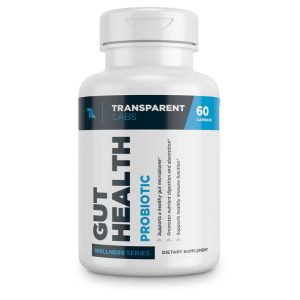

Key product features
What you should know
Transparent Labs Gut Health probiotic is a comprehensive supplement with clinically studied strains of Lactobacilli, Bifidobacteria, and Streptococci that aim to support the gut’s microbiota.
- Gut Health from Transparent Labs features 10 probiotic strains from three highly studied families of microorganisms. (2)
- At $1.53 per serving, Gut Health costs more than the average price for probiotic supplements.
- Transparent Labs probiotic also contains inulin fructooligosaccharides (FOS), a prebiotic that supports the growth and activity of microorganisms in the gut. (2, 4)
- The multistrain probiotic supplement makes a good choice for individuals who want a product that can support bowel regularity and is free from preservatives and artificial ingredients. (5)
Transparent Labs Gut Health probiotic overview
Transparent Labs is a supplement company specializing in sports nutrition that’s popular among gym-goers, providing products that support fitness goals. Some of their best selling products include pre-workout powder for energy and focus, protein powders that build muscle, and creatine powder to support post-workout recovery. They also have health and wellness supplements including Hydrate to replenish electrolytes and Prebiotic Greens powder, a gut-flora friendly drink that provides fiber, vitamins, and minerals.
Gut Health is the probiotic supplement offered by Transparent Labs, and one of their best sellers.
Transparent Labs Gut Health formula
Transparent Labs probiotic contains 10 species of friendly bacteria from three families of microorganisms, including Lactobacillus, Bifidobacterium, and Streptococcus.
Lactobacillus
Lactobacillus is a type of lactic acid bacteria (LAB) found in the gut that supports digestion, helps make nutrients, and protects against germs. (6) Six of the 10 strains in Gut Health are from the Lactobacillus family and include L. acidophilus (LA-14), L. rhamnosus (LR-32), L. casei (LC-11), L. plantarum (LLP-115), L. paracase (LPC-37), and L. salivarius (LS-33).
Transparent Labs identifies each probiotic by family (Lactobacillus), strain (acidophilus), and strain designation (LA-14). (2) The strain designation is important because it helps link potential benefits to specific strains backed by scientific evidence. (2)
The World Gastroenterology Organisations suggests that healthcare professionals use strain designations when making probiotic recommendations, so they get the strain that fits their need. (2) For example, preliminary research suggests that L. acidophilus (LA-14) may stimulate and regulate the respiratory immune system and inhibit growth of Helicobacter pylori, the bacteria that causes stomach ulcers. (7, 8) It also supports women’s vaginal health, helping maintain vaginal flora. (9, 10) In addition, it helps break down and make other nutrients readily available.
More recently, researchers are finding that strains of probiotics that provide similar benefits may work better together rather than individually. (2) Many multi-strain probiotic supplements on the market haven’t been studied to determine how the chosen combination and dose may benefit the person taking that particular supplement. (2)
While Transparent Labs Gut Health may have clinically studied microorganisms, the supplement formula hasn’t been clinically studied to determine potential benefits. But they don’t make any specific health claims about Gut Health other than promoting a healthy gut microbiome.
Bifidobacterium
Bifidobacterium is a family of friendly bacteria in the gut that protects against germs, regulates immune health, helps breakdown fiber, and makes nutrients, such as vitamin B. (11) The friendly bacteria may also help keep you regular, reduce risk of antibiotic associated diarrhea (AAD), and minimize the frequency and severity of ulcerative colitis symptoms. (2, 11)
Transparent Labs probiotic has three strains of Bifidobacteria, including B.lactis (BL-04), B. bifidum (BB-02), and B. breve (BB-03).
The probiotic supplement may not make any specific health claims, but it does contain a strain that may benefit body composition. A 2023 clinical trial published in Nutrients found that supplementing with 5 billion colony forming units (CFUs) of B. breve (BB-03) lowered body fat mass, weight, and body mass index (BMI) better than a placebo in a group of overweight adults following their usual diet or exercise routine. (12) The researchers theorize that supplementing with B. breve (BB-03) improves the microbiota in a way that benefits energy use and fat storage. (12) Though promising results, larger studies with a more diverse population are needed before claims are made.
Both Lactobacilli and Bifidobacteria may help regulate bowel movements by increasing frequency, shortening transit time, and improving stool quality. (6, 12)
Streptococcus
The probiotic from Transparent Labs also has Streptococcus thermophilus (ST-21), a lactic acid bacteria used to make yogurt. S. thermophilus may assist in the production of antioxidant compounds and stimulate the gut’s immune system. It also helps break down food and absorb nutrients. However, research on potential benefits is mixed due improper identification of the strain in studies. (13)
Other active ingredients
Transparent Labs Gut Health probiotic also contains 100 milligrams of inulin fructooligosaccharide (FOS), a prebiotic that influences the composition and activity of microorganisms in the gut. (2)
Prebiotics are indigestible carbohydrates (fiber) that serve as a source of food for the microorganisms. They also produce short-chain fatty acids (SCFAs), molecules that may offer protection against obesity and inflammatory bowel disease. (4, 14) Combining prebiotics and probiotics makes the Transparent Labs supplement a synbiotic, supporting health of the probiotics and the gut. (2) Feeding the probiotics in the gut help keep more of the good bacteria alive.
Magnesium stearate is another ingredient in the probiotic. Poor magnesium intake is associated with decreased levels of Bifidobacteria in the gut and an increase in inflammatory markers. (15) Gut Health doesn’t list the amount of magnesium provided by the supplement, but many adults in the United States fail to meet daily needs. (16) A 2022 clinical study published in Frontiers in Nutrition found that co-administering 500 milligrams of magnesium with a multistrain probiotic lowered inflammatory markers. (15)
Dose and capsule
One serving of Gut Health (two capsules) contains 100 billion CFUs. There’s no standard dose for probiotics, and the amount needed depends on strain and use. (2) Dosing typically ranges from 1 to 10 billion CFUs, but can be as high as 300 billion CFUs. (2) The higher the CFUs the more chances the bacteria make it through the digestion process alive.
Transparent Labs lists the CFUs for each strain, a good thing to look for when shopping for a probiotic.
- L.acidophilus (LA-14): 25 billion CFUs
- L. rhamnosus (LR-32): 15 billion CFUs
- L. casei (LC-11): 10 billion CFUs
- L. plantarum (LLP-115): 10 billion CFUs
- L. paracasei (LPC-37): 10 billion CFUs
- L. salivarius (LS-33): 5 billion CFUs
- B.lactis (BL-04): 10 billion CFUs
- B. bifidum (BB-02): 5 billion CFUs
- B. breve (BB-03): 5 billion CFUs
- S. thermophilus: 5 billion CFUs
Probiotics contain live microorganisms that may die-off during shipping and storage, so manufacturers may add in overages to ensure potency to the end of shelf-life. (2) When evaluating probiotic doses for reviews, our team looks for probiotics that provide the CFU count at the date of expiration, not at manufacturing. The dose for the Transparent Labs probiotic is at the time of manufacturing, which is a drawback that lowers our score.
One measure Transparent Labs takes to ensure potency of their probiotics is the use of a hypromellose capsule that protects the microorganisms as it travels through the digestive tract. (17) Inulin may also provide protection against stomach acid, which also helps keep more alive. (18)
Transparent Labs Gut Health is shelf stable, so you don’t have to keep it refrigerated, which is a plus.
Testing and certifications
All Transparent Labs products are third-party tested, giving consumers access to the certificates of analysis (COA) on their website. Third-party testing is an independent lab test that checks the ingredients and dose of a supplement to make sure it matches the label, and is one of the safety factors we use for our supplement evaluations. (19) Third-party testing also checks for harmful pathogens and heavy metals.
Additionally, the probiotic supplement is Informed Choice certified, so it’s regularly tested for banned substances like stimulants, anabolic steroids, and diuretics. Athletes who undergo drug testing for their sport want to look for supplements with this certification.
Price
Transparent Labs Gut Health probiotic costs $1.53 per serving, which is about $0.50 above the average market price for a probiotic supplement. But we think the multi-strain formula is a good value given the types of probiotics, dose, and safety measures. You can save 10% with the Transparent Labs subscription program, getting a new shipment of probiotics every 15, 30, or 45 days.
Transparent Labs probiotics side effects
Probiotics are generally safe and well-tolerated by most people. Side effects are mild and generally limited to gastrointestinal symptoms. (3) However, you may experience gas and bloating with Transparent Labs probiotics if you have irritable bowel syndrome or are sensitive to FOS. (20)
If you have concerns about probiotic side effects, talk to a doctor for guidance on strains and dose to reduce risk. You also want to talk to a doctor if you’re immunocompromised or have a chronic health condition before adding a probiotic to your regimen. (3)
Benefits of Transparent Labs probiotic
Transparent Labs Gut Health may offer many benefits. It contains common probiotic strains at a potent dose, and includes a prebiotic to further support the microorganisms in the supplement and your gut. Probiotics in general may offer many potential benefits such as: (2)
- Support gut immune health and the immune system
- Strengthen the intestinal barrier
- Make nutrients
- Help with digestion and increases nutrient absorption
The supplement may support gut microbiota balance, benefitting overall health. However, this particular formula has not been clinically tested, so no specific claims can be made.
Transparent Labs also uses a capsule that protects viability of the microorganisms as it travels through the gastrointestinal tract.
The supplement is also third-party tested and Informed Choice certified, has no artificial colors or sweeteners, and is gluten-free and non-GMO.
Specs
| Dosage | 2 capsules |
| Price per serving | $1.53 |
| Servings per container | 30 |
| CFUs | 100 billion |
| Strains | Lactobacillus acidophilus, Lactobacillus rhamnosus, Lactobacillus casei, Lactobacillus plantarum, Lactobacillus paracasei, Bifidobacterium lactis, Lactobacillus salivarius, Streptococcus Thermophilus, Bifidobacterium bifidum, Bifidobacterium breve |
| Storage | Shelf stable |
| Certifications | Informed Choice |
We’ve featured Transparent Labs Gut Health probiotic in:
Transparent Labs vs other probiotics on the market
We’ve evaluated numerous probiotic supplements, and Transparent Labs Gut Health is featured in many of our reviews. Transparent Labs is a multi-strain probiotic with added prebiotics designed to support gut health, and similar to many of the other probiotics we’ve reviewed.
However, Transparent Labs hasn’t undergone clinical studies to determine the benefits of its formula. VSL#3 contains many of the same strains as Transparent Labs, but has undergone clinical studies that show that it may prevent and treat digestive conditions and strengthen the intestinal lining. (21) However, VSL#3 costs about $0.70 more per serving than Gut Health, and you can only take it with physician supervision.
Ritual Synbiotic+ is also a bit pricier than Gut Health and uses active fluorescent units (AFUs) instead of CFUs for probiotic dose. AFUs is a less common measure that counts viable microorganisms in a fresh sample, while CFUs are based on counts from a petri dish. (22)
Gut Health costs more than some of the other probiotics, such as Sports Research Daily Probiotics with Prebiotics, which costs about $0.70 less than Transparent Labs probiotics. But the more affordable probiotic has only 60 billion CFUs and isn’t as transparent with their labeling or sharing strain designation.
Overall, Transparent Labs probiotic is a high-quality supplement with high ratings. It’s more expensive than other probiotics, but it’s transparent about ingredients and third-party testing.
Compare Transparent Labs Gut Health Probiotic
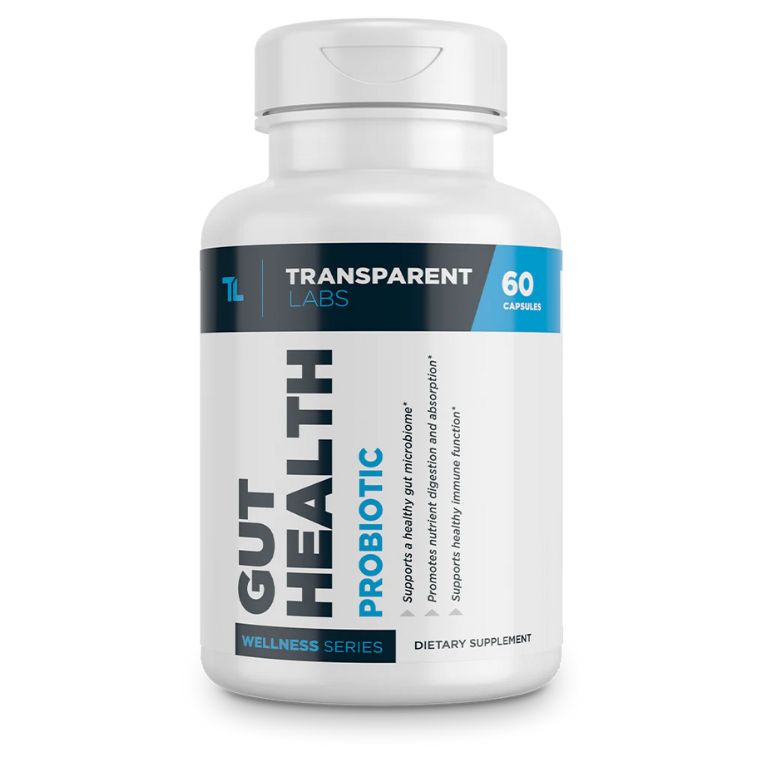
|
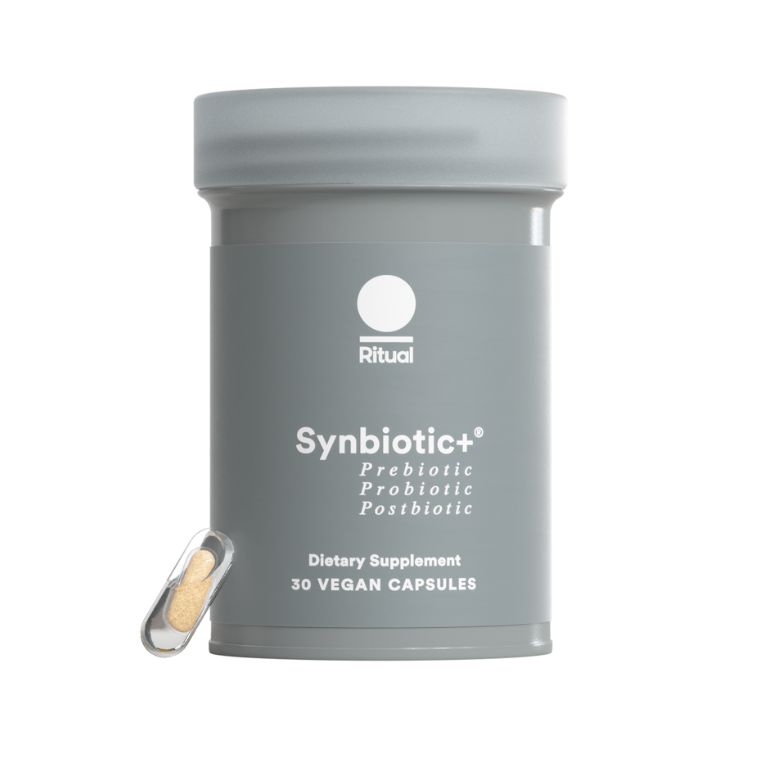
|
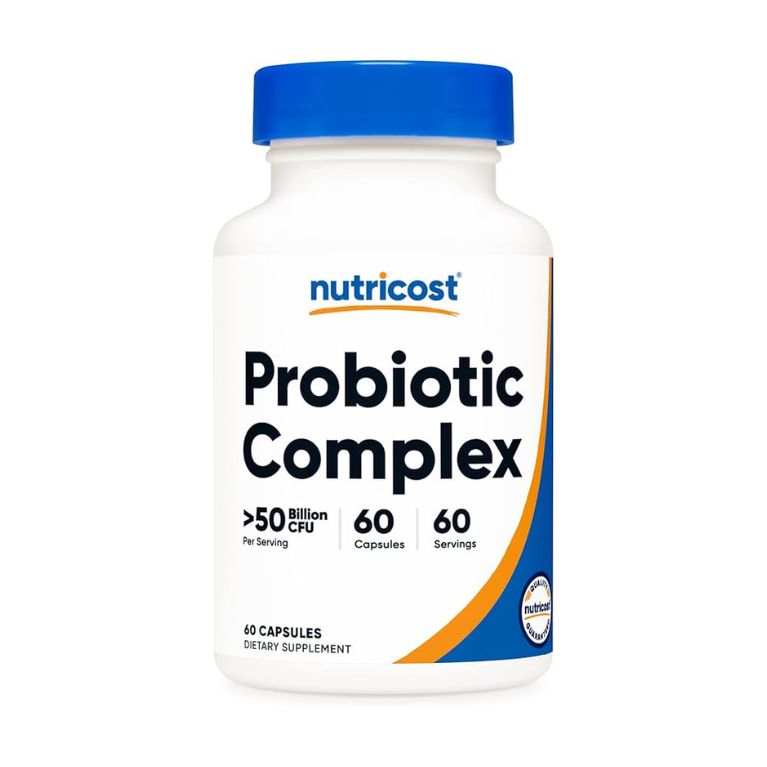
|
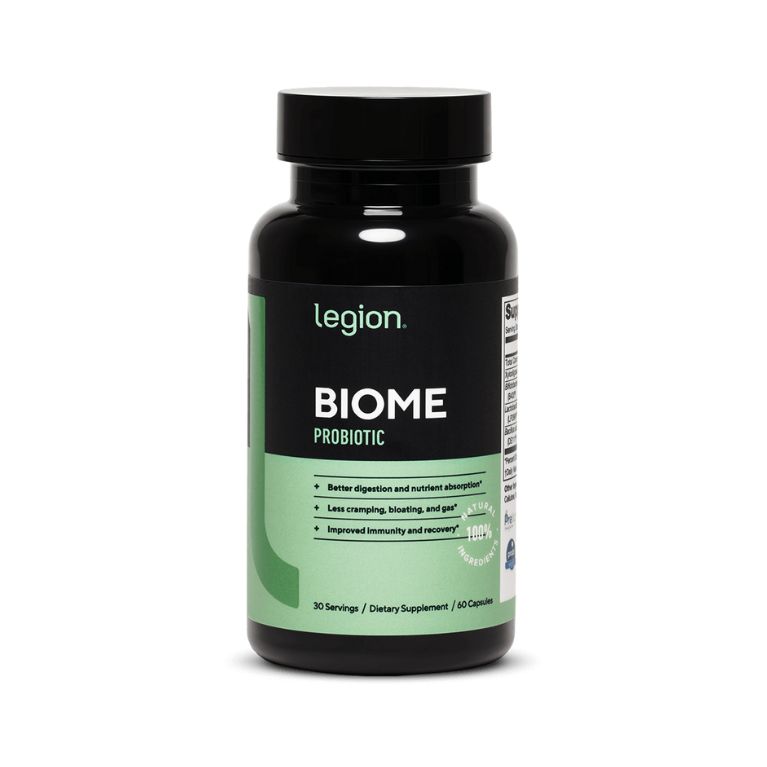
|
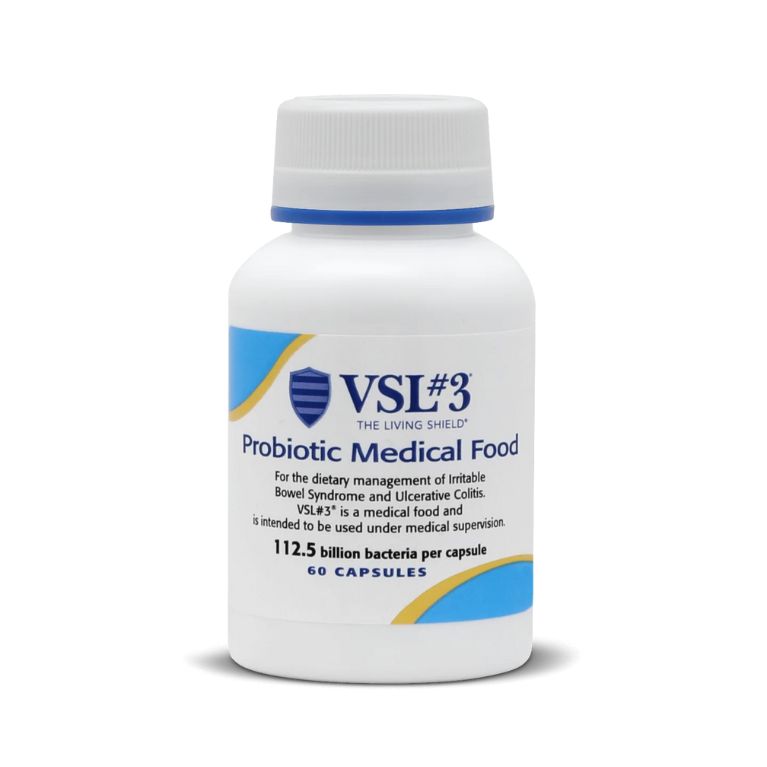
|
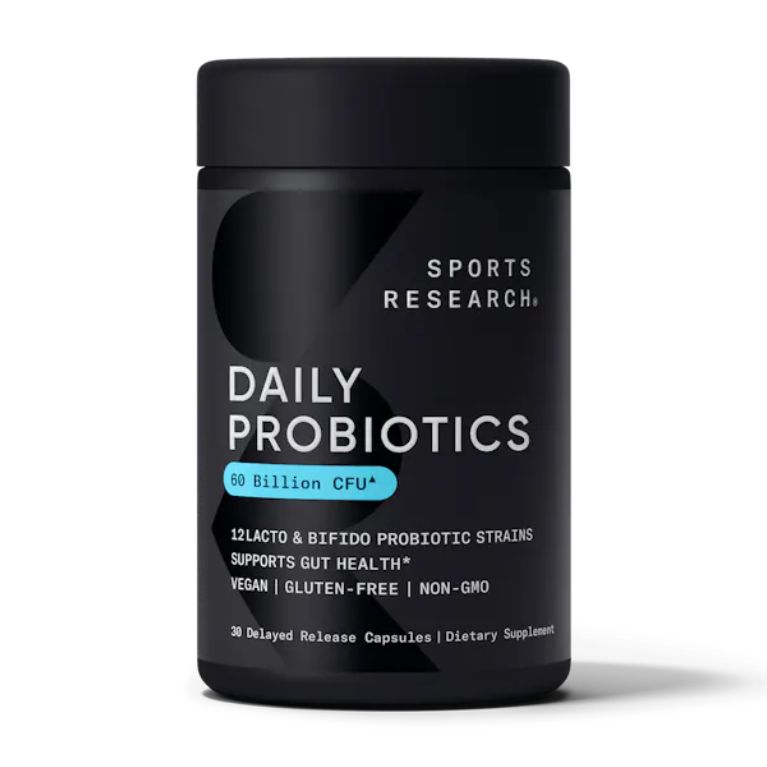
|
|
| Transparent Labs Gut Health | Ritual Synbiotic+ | Nutricost Probiotic Complex | Legion Athletics Biome | VSL#3 Capsules | Sports Research Daily Probiotics | |
| Rating | ||||||
| Cost per serving | $1.53 | $1.80 | $0.33 | $1.67 | $2.20 | $0.83 |
| Serving size | 2 capsules | 1 capsule | 1 capsule | 2 capsules | 2 capsules | 1 capsule |
| Dose | 100 billion CFUs | 11 billion CFUs | 50 billion CFUs | 25 billion CFUs | 112.5 billion CFUs | 60 billion CFUs |
| Key ingredients | L. acidophilus, L. rhamnosus, L. casei, L. plantarum, L. paracasei, B. lactis, L. salivarius, Streptococcus Thermophilus, B. bifidum, B. breve | L. rhamnosus, B. animalis | L. acidophilus, L. rhamnosus, L. casei, L. plantarum, S. boulardii, B. longum, L. fermentum, B. bifidum, L. gasseri, L. lactis | B. lactis, B. subtilis, L. plantarum | Streptococcus thermophilus, B. breve, B. lactis, L. acidophilus, L. plantarum, L. paracasei, L. helveticus | L. plantarum, Lactococcus lactis, B. animalis, L. acidophilus, L. fermentum, L. rhamnosus GG, L. casei, L. paracasei, B. bifidum, B. breve, B. longum infantis, B. longum |
How we test probiotic supplements
Our goal is to give you all the information you need to choose a supplement that aligns with your health goals and lifestyle. We extensively research all of the products included in our reviews, using our supplements testing methodology for scoring.
For our probiotic evaluations and reviews, we use our testing methodology and scoring system for probiotics. Based on our general testing methodology system, the probiotic testing and scoring is more specific and includes eight primary categories such as strain type and dose, testing for safety, and cost per serving.
Cultures contained–25%
The effectiveness of a probiotic product depends on the strains it contains, as different probiotic strains offer various health benefits. For example, some strains support digestive health, while others may help with immune function or address specific health conditions such as irritable bowel syndrome (IBS). It’s important to select probiotic strains that align with your health goals and needs. Probiotics are identified by their specific strain, which includes the Genus–or classification, or family–and species, which is a further identification within the “family” along with a strain designation.
Proprietary culture blend–25%
To make an informed choice when selecting probiotic supplements, it’s important to look for products that provide clear information about the specific strains of probiotics contained in the formulation. Proprietary blends often do not disclose the specific strains and their respective concentrations used in the product. Consumers cannot make informed decisions about the probiotic supplement without knowing the specific strains and their concentrations. Different probiotic strains have different health benefits, and the effectiveness of a product depends on the specific strains used and their viability.
Encapsulated with food source–20%
Encapsulating probiotics with a food source like inulin can help protect the beneficial bacteria from harsh stomach acids and bile, increasing their chances of survival as they pass through the digestive system and reach the intestines where they are needed. This encapsulation can provide a protective barrier, potentially extending the shelf life of the probiotic supplement.
Live and active bacterial cultures–15%
According to an expert panel on probiotics and prebiotics, “Probiotics are live microorganisms which when administered in adequate amounts confer a health benefit on the host.” While most of the data support live and active cultures, some data suggest dead cultures could exert benefit as well, though they aren’t labeled as such and may be referred to as postbiotics or parabiotics. Since the “live and active cultures” number is what’s stated on labels for probiotics, if at all, we evaluate products based on whether they include a statement on their label confirming the presence of viable microorganisms.
Colony forming units (CFU) at the end of shelf life date–10%
In the context of probiotics, CFUs represent the number of live microorganisms, typically bacteria, present in a probiotic supplement at the end of its shelf life. This value indicates the product’s potency and ability to deliver a sufficient quantity of live, beneficial microorganisms to exert their intended health effects. Generally speaking, it is better to have more strains and a variety of them, as our microbiome consists of approximately 38 trillion microbes. Therefore, it is best to have at least 20 billion or more CFUs, equivalent to a drop of water on a vast sea.
Type–5%
Probiotic supplements come in various forms, each with its own advantages and considerations. The choice of which form is best depends on individual preferences, needs, and factors such as convenience and lifestyle.
Certifications
Testing certifications show whether a dietary supplement contains what the brand says it contains in the doses advertised (potency).
Here are the certifications that stand out:
- Third-party testing
- NSF
- U.S. Pharmacopeia (USP)
- Labdoor
- Informed Sport
- Informed Choice (ICFS)
- Informed Ingredient
Bonus points
To recognize innovation and encourage healthy competition, we incorporate bonus credits into our scores. Bonus points provide a small boost to the product’s overall score and are equally weighted.
- Sustainable packaging
FAQs
Is Transparent Labs FDA approved?
Supplements from Transparent Labs, including the probiotics, are not FDA approved. No single dietary supplement is FDA approved. (19) The FDA requires supplement manufacturers to follow Good Manufacturing Practices (GMP) when making their supplement to ensure safety and quality. (19)
Supplement makers are responsible for evaluating the safety and labeling of their product before it hits the market. The FDA takes action against any supplement that’s misbranded or contains ingredients not listed on the label after it hits the shelves. (19)
These statements have not been evaluated by the Food and Drug Administration. These products are not intended to diagnose, treat, cure, or prevent any diseases.
Our experts
Victoria Burgess, Ph.D., CSCS, CISSN
Victoria Burgess earned her Ph.D. in Health and Human Performance from Concordia University Chicago and holds her NSCA CSCS and Certified Sports Nutritionist (CISSN). She is an adjunct professor in the Human Performance and Nutrition department at Concordia University Chicago & Parker University, where she teaches undergraduate, graduate, and doctoral level courses.
Lauren Panoff, MPH, RD
Lauren Panoff, MPH, RD is a plant-based registered dietitian, freelance writer, and content strategist for health and nutrition brands. She completed her nutrition education at Colorado State University, her dietetic internship through Michigan Medicine, and holds a Master of Public Health degree from Michigan State University. Lauren has been working in the wellness industry for over 15 years, including time spent in project management, public health standards, dietary supplement testing, inpatient and outpatient nutrition therapy, and child education. She has followed a plant-based lifestyle for over a decade and is passionate about helping others enjoy a healthier and more meaningful life.
Jessica Coulon
Jessica is a contributing editor and writer who specializes in fitness, health, nutrition, and science content. Previously, she was an editor for Popular Mechanics and Bicycling, where she covered pro cycling news, wrote how-to guides, and tested all the latest and greatest bike gear. She was also a regular shoe tester and contributor for Runner’s World. You can often find her skiing or riding her mountain bike, and racing with the F1RE female enduro team.
Lily Moe
Lily is a Brooklyn-based writer and editor with over seven years of experience in health media. As a former Fitness Coach, Lily’s editorial prowess has largely focused on fitness, nutrition, and weight management. She has also spent a fair share of time in testing labs, analyzing everything from protein powders to yoga mats. Her work has appeared in Verywell Fit, Verywell Mind, Health, and more.
Kelly Uhler
Kelly has a multifaceted background in elder care, health care, and copywriting. She has worked for organizations such as A Place For Mom and Homecare.com, which gave her the opportunity to work closely with families, providing reliable information to help them make informed decisions about their loved one’s health, safety, and quality of life.

Jill Corleone, RD
Fortune Recommends Nutrition Writer
About Author
Jill’s life has centered around nutrition and fitness for more than two decades. After earning her bachelor of science in nutrition at New York University in Manhattan, Jill went on to complete her internship at the University of Medicine and Dentistry of New Jersey in Newark.
She spent the early part of her career working as a clinical dietitian with a focus on pediatric nutrition. She then transitioned into management. Jill began her career as a freelance writer in 2007 while working as a clinical nutrition manager in Florida. She became a full-time writer in 2010 after the birth of her first child.
Jill has written for numerous publications, including Verywellfit, Diabetes Self-Management, Huffington Post, Livestrong.com, and SFGate.
Resources
- Adak, A., & Khan, M. R. (2019). An insight into gut microbiota and its functionalities. Cellular and molecular life sciences : CMLS, 76(3), 473–493. https://doi.org/10.1007/s00018-018-2943-4
- World Gastroenterology Organisation Global Guidelines. Probiotics and prebiotics. Accessed October 9, 2024. https://www.worldgastroenterology.org/guidelines/probiotics-and-prebiotics/probiotics-and-prebiotics-english
- Office of Dietary Supplements. Probiotics. Accessed October 9, 2024. https://ods.od.nih.gov/factsheets/Probiotics-HealthProfessional/
- Davani-Davari, D., Negahdaripour, M., Karimzadeh, I., Seifan, M., Mohkam, M., Masoumi, S. J., Berenjian, A., & Ghasemi, Y. (2019). Prebiotics: Definition, Types, Sources, Mechanisms, and Clinical Applications. Foods (Basel, Switzerland), 8(3), 92. https://doi.org/10.3390/foods8030092
- Garzon Mora, N., & Jaramillo, A. P. (2024). Effectiveness of Probiotics in Patients With Constipation: A Systematic Review and Meta-Analysis. Cureus, 16(1), e52013. https://doi.org/10.7759/cureus.52013
- Dempsey, E., & Corr, S. C. (2022). Lactobacillus spp. for Gastrointestinal Health: Current and Future Perspectives. Frontiers in immunology, 13, 840245. https://doi.org/10.3389/fimmu.2022.840245
- Artanti, D., Sari, Y. E. S., Azizah, F., Puwaningsih, N. V., Rohmayani, V., & Nasrullah, D. (2021). Effect of giving probiotic supplement Lactobacillus acidophilus La-14 as an immunomodulator to maintain a respiratory system in Mus musculus. Iranian journal of microbiology, 13(3), 381–388. https://doi.org/10.18502/ijm.v13i3.6401
- Shen, S., Ren, F., Qin, H., Bukhari, I., Yang, J., Gao, D., Ouwehand, A. C., Lehtinen, M. J., Zheng, P., & Mi, Y. (2023). Lactobacillus acidophilus NCFM and Lactiplantibacillus plantarum Lp-115 inhibit Helicobacter pylori colonization and gastric inflammation in a murine model. Frontiers in cellular and infection microbiology, 13, 1196084. https://doi.org/10.3389/fcimb.2023.1196084
- Howeru. Lactobacillus LA-14. Accessed October 16, 2024. https://hcp.howaru.com/strains/la-14/
- Mei, Z., & Li, D. (2022). The role of probiotics in vaginal health. Frontiers in cellular and infection microbiology, 12, 963868. https://doi.org/10.3389/fcimb.2022.963868
- O’Callaghan, A., & van Sinderen, D. (2016). Bifidobacteria and Their Role as Members of the Human Gut Microbiota. Frontiers in microbiology, 7, 925. https://doi.org/10.3389/fmicb.2016.00925
- Sung, H. K., Youn, S. J., Choi, Y., Eun, S. W., & Shin, S. M. (2022). Body Fat Reduction Effect of Bifidobacterium breve B-3: A Randomized, Double-Blind, Placebo Comparative Clinical Trial. Nutrients, 15(1), 28. https://doi.org/10.3390/nu15010028
- Martinović, A., Cocuzzi, R., Arioli, S., & Mora, D. (2020). Streptococcus thermophilus: To Survive, or Not to Survive the Gastrointestinal Tract, That Is the Question!. Nutrients, 12(8), 2175. https://doi.org/10.3390/nu12082175
- Holmes, Z. C., Villa, M. M., Durand, H. K., Jiang, S., Dallow, E. P., Petrone, B. L., Silverman, J. D., Lin, P. H., & David, L. A. (2022). Microbiota responses to different prebiotics are conserved within individuals and associated with habitual fiber intake. Microbiome, 10(1), 114. https://doi.org/10.1186/s40168-022-01307-x
- Mahboobi, S., Ghasvarian, M., Ghaem, H., Alipour, H., Alipour, S., & Eftekhari, M. H. (2022). Effects of probiotic and magnesium co-supplementation on mood, cognition, intestinal barrier function and inflammation in individuals with obesity and depressed mood: A randomized, double-blind placebo-controlled clinical trial. Frontiers in nutrition, 9, 1018357. https://doi.org/10.3389/fnut.2022.1018357
- Office of Dietary Supplements. Magnesium. Accessed October 9, 2024. https://ods.od.nih.gov/factsheets/Magnesium-HealthProfessional/
- Marzorati, M., Possemiers, S., Verhelst, A., Cadé, D., Madit, N., Van de Wiele, T. (2015). A novel hypromellose capsule, with acid resistance properties, permits the targeted delivery of acid-sensitive products to the intestine. LWT – Food Science and Technology. 60. 544-551. https://doi.org/10.1016/j.lwt.2014.08.040
- Singh, S., Gupta, R., Chawla, S., Gauba, P., Singh, M., Tiwari, R. K., Upadhyay, S., Sharma, S., Chanda, S., & Gaur, S. (2022). Natural sources and encapsulating materials for probiotics delivery systems: Recent applications and challenges in functional food development. Frontiers in nutrition, 9, 971784. https://doi.org/10.3389/fnut.2022.971784
- Office of Dietary Supplements. Dietary supplements: What you should know. Accessed October 10, 2024. https://ods.od.nih.gov/factsheets/WYNTK-Consumer/
- American College of Gastroenterology. Low-FODMAP diet. Accessed October 10, 2024. https://gi.org/topics/low-fodmap-diet/
- Cheng, F. S., Pan, D., Chang, B., Jiang, M., & Sang, L. X. (2020). Probiotic mixture VSL#3: An overview of basic and clinical studies in chronic diseases. World journal of clinical cases, 8(8), 1361–1384. https://doi.org/10.12998/wjcc.v8.i8.1361
- Boyte, M. E., Benkowski, A., Pane, M., & Shehata, H. R. (2023). Probiotic and postbiotic analytical methods: a perspective of available enumeration techniques. Frontiers in microbiology, 14, 1304621. https://doi.org/10.3389/fmicb.2023.1304621
